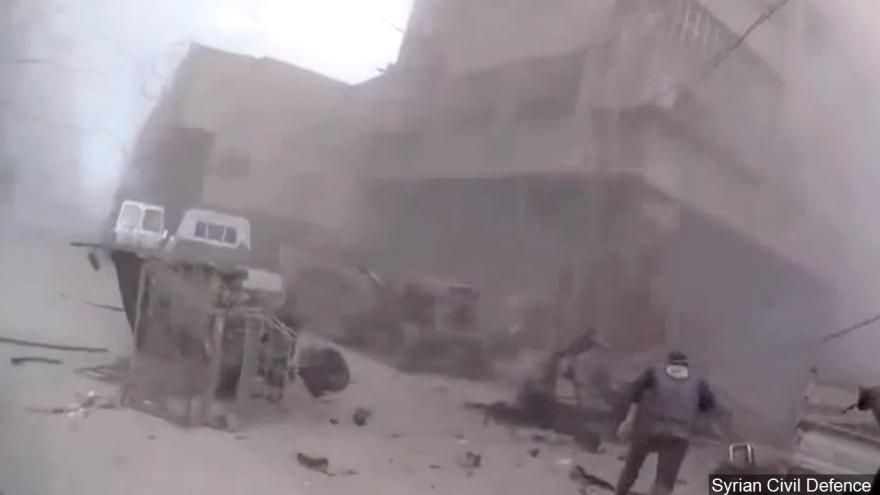Experts to visit suspected chemical attack site in Syria on Wednesday

By Angela Dewan, CNN
(CNN) -- A team of international chemical weapons experts will on Wednesday visit the site of a suspected gas attack in the Syrian city of Douma, a Russian military official said, rejecting accusations that Russia and Syria were blocking access to the area.
Russia has been in a war of words with Western leaders since the April 7 strike in Douma which left dozens of people dead. The United States, Britain and France blamed the incident on Syrian President Bashar al-Assad's regime and responded with airstrikes on several Syrian sites over the weekend. Russia is Assad's most powerful ally and has helped turn the tide of the Syrian war in his favor.
The UK envoy to the Organization for the Prohibition of Chemical Weapons (OPCW), Peter Wilson, said Monday that a fact-finding team had been in Syria since Saturday but had been denied access to Douma.
"Wednesday is when we expect the arrival of the OPCW experts and Russia is not preventing this in any way," the military official, Igor Kirilov, told journalists at The Hague late Monday.
Russia's Deputy Foreign Minister Sergei Ryabkov had earlier said the team's arrival was hampered by the weekend airstrikes.
The OPCW team is tasked with assessing whether banned chemical substances were used in Douma. Senior US officials have said their assessments show both chlorine and Sarin gas. Syria and Russia have both denied a chemical attack took place.
The US envoy to the OPCW expressed concern Monday of Russian tampering at the site, warning that further delays could compromise the team's ability to accurately assess the area.
Russian Foreign Minister Sergey Lavrov dismissed those concerns Monday, giving his guarantee in an interview with the BBC that there had been no Russian tampering. He said last week, however, that Russian experts had gone to the site in Douma and found "no trace" of chemical weapons use.
The Douma attack has heightened tensions between Russia and Western leaders, already at loggerheads over a number of issues, including the poisoning of a Russian ex-spy and his daughter in the UK. British Prime Minister Theresa May blamed Russia for the attack, and more than 20 countries collectively expelled more than 100 Russian diplomats to show solidarity with Britain over the case. Russia denied involvement in the poisoning.
The Kremlin has been deflecting accusations from the West ever since the Douma strike, and has fired several back at the US and UK. Russian officials accused UK intelligence services of helping stage the Douma attack, which the UK had strongly denied.
Russia's representative to the OPCW, Alexander Shulgin, accused the White Helmets volunteer rescue group of faking a chemical attack, pointing to US funding of the group as part of the problem. The White Helmets have denied ever fabricating attacks.
In Washington, the White House appeared to be backpedaling on plans to impose new sanctions on Russia.
On Sunday, US Ambassador to the United Nations Nikki Haley told CBS the Trump administration would announce more sanctions against Russia as soon as Monday, adding that Washington had to send "a strong message" about the use of chemical weapons. She said sanctions would be placed on companies dealing with equipment related to Assad and chemical weapons use.
But Monday passed with no announcement, and a Washington Post report said Trump had yet to sign off on the move. The report cites sources close to the matter as saying Trump was not yet comfortable with additional sanctions.
The-CNN-Wire
™ & © 2018 Cable News Network, Inc., a Time Warner Company. All rights reserved.
